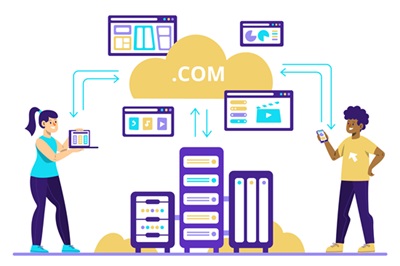.NET Framework
.Net framework is a software development framework developed by Microsoft. The, net framework is a development tool that include variety of programming language such as c#,F#,visual basic and many more. With the help of this framework we can developed different kind of application such as windows application, web application mobile application and many more.
Key feature of .NET framework
Windows-only framework:
we know .NET framework is always know for windows based application or framework because if you create a application using .NET Framework it is only run windows machine. It is ideal for desktop application and server-side application within the Microsoft ecosystem.
Comprehensive Class Library:
One of the most .Net Framework key strength is its extensive class library ,these library provides building functionality for different task, including file handling database interaction, network user interface design etc.
Common language Run time the clr is execution engine of .net framework. the main task of CLR is its manages memory handling handle exception and load the code written in any supported .net framework . it also provides Garbage collection.
Multiple programming language
.Net framework support various programming language including C#,visual basic F# and many more.
Popular Languages:
C#: One of the most commonly used programming languages in .NET, known for its simplicity and versatility.
VB.NET: A language that evolved from Visual Basic, offering easier syntax for rapid application development.
F#: A functional-first programming language within the .NET ecosystem.
ASP .NET: Microsoft developed this web development framework under the .NET framework. It is a popular choice for building web applications and services. The framework enables developers to create dynamic websites, APIs, and MVC applications.

Use Case:
Desktop Applications: Best Use case for .net framework like Developers use tools like Windows Forms and WPF (Windows Presentation Foundation) to create rich, graphical desktop applications.
Web Development: Using ASP.NET, you can create dynamic websites and services.
Enterprise-Level Applications: It’s widely used in large-scale business applications, especially for internal tools and services.
Integration with Microsoft Tools: Often used in environments that rely heavily on Microsoft technologies such as Azure, SQL Server, and Office.
Game Development: The framework can be used with Unity, a popular game engine, for developing games for Windows platforms. Backend for Cloud Solutions: Although newer .NET Core versions are more common, .NET Framework still supports backend services that integrate with Microsoft Azure, handling tasks like API development, authentication services, and processing large datasets.
NET Core:
.NET Core is a new open source ,cross-platform framework that allows developers to build applications for all operating systems including windows Linux and MAC. As part of the unified .NET platform (starting from .NET 5), it features a modular design, improved speed, and greater flexibility compared to the traditional .NET Framework
Feature:
- Built-in -support for dependency injection
- There is no web.config file. we can store all custom configuration into an appsetting.json file.
- There is no Global .asax file . we can now register and use the services in startup file.
- It has good support for asynchronous programming.
- Support for multiple platform
- Integrate with modern UI Framework like Angular,React etc
Startup:
It is entry point of .net core application . every .asp .net core application must have this class . it is not necessary that the class name must be Startup, it can be anything, we can configure the startup in the program class.
Note: Startup class is only in till .net 3 and 5 . .net 5 and above there are program class.
Startup class contain two main method:
ConfigureServices(): The ConfigureService method is a place where we can register your dependent classes with build in IOC container after registering the dependent classes ,it can be use any where in the application.
Configure(): The configure method is place where we can configure the application request pipeline for our asp .net core application.
Use Cases of .NET Core:
Web Applications:
ASP.NET is an effective web framework for creating scalable, high-performance web applications. RESTful APIs, dynamic webpages, and even fully functional SaaS applications are made with its help by businesses.
- Example: Online eCommerce platforms like Alibaba and Stack Overflow use .NET Core for speed and scalability.
Cloud-Native Applications:
- .NET Core’s support for microservices and containerization (Docker, Kubernetes) makes it an excellent choice for building cloud-native applications.
Example: Companies frequently use.NET Core to create apps that can be deployed across different cloud providers, leveraging elastic scaling and worldwide distribution in cloud settings.
Microservices:
- With its modular nature and support for containerization, .NET Core enables developers to design, deploy, and scale each service independently in microservice-based architectures.
Example Large systems with numerous separate components, such as financial services, logistics, and retail platforms.
High-Performance APIs:
- .NET Core is excellent for building high-performance, lightweight APIs that handle a significant number of requests.
- Example: Real-time chat applications, order processing systems, or social media platforms where performance and scalability are crucial.
· IoT (Internet of Things):
- .NET Core supports IoT development, which involves small, constrained devices that need efficient and reliable software.
- Example:Industrial automation systems use IoT devices for data collection and control, running on different operating systems and hardware.
Containers and DevOps:
- .NET Core works smoothly with Docker and Kubernetes, making it a popular choice for developers working on containerized applications. This feature enables teams to efficiently deploy apps within current CI/CD (Continuous Integration/Continuous Deployment).
- Example: DevOps pipelines that deploy microservices to production environments quickly and reliably
Summary of Differences:
| Feature | .NET Framework | .NET Core (and .NET 5+) |
|---|---|---|
| Platform Support | Windows-only | Cross-platform (Windows, Linux, macOS) |
| Performance | Good for Windows applications | Optimized for high-performance scenarios |
| Architecture | Monolithic | Modular |
| Application Types | Windows desktop, ASP.NET Web Forms, WCF | ASP.NET Core, Microservices, Cloud Apps |
| Future Development | No new features (post .NET 4.8) | Actively developed with new features |
| Open Source | Closed source | Open source and community-driven |
| Use Cases | Enterprise Windows apps, Legacy apps | Modern web, cloud, and cross-platform |
fore more details please visit : apitpoint




Pingback: ASP.NET Core MVC Explained: A Quick Overview for Developers - APITPOINT-Blog